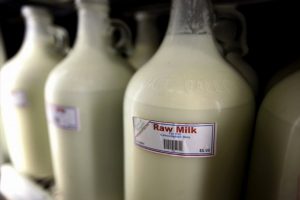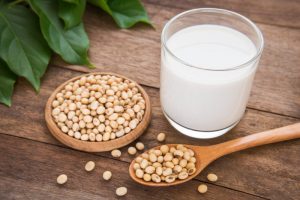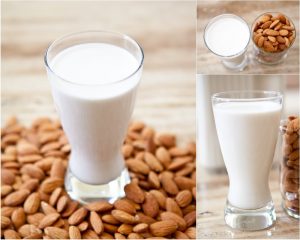The milk aisle is changing, now offering a growing number of options for what to pour on your cereal or drink down as a late-night snack. But what do the newer types of milk mean for your heart health if you have high cholesterol? Old-fashioned cow’s milk, for example, is loaded with calcium and vitamins A and D, which are all good for your heart and overall health.
But too much of the saturated fat and cholesterol in whole milk — and even in 2 percent milk — may counteract those health benefits. When you’re trying to get to healthy cholesterol levels, you’ll want to limit the amount of saturated fat and cholesterol in your diet.
Alternative milks can provide similar nutritional benefits if you’re watching your cholesterol; are lactose intolerant, vegan, or allergic to certain proteins in cow’s milk; or if you simply prefer something other than cow’s milk. “People choose a milk based on tolerability and taste — in addition to health beliefs,” says Deborah Krivitsky, RD, director of nutrition at the Cardiovascular Disease Prevention Center at Massachusetts General Hospital in Boston. “Each milk will provide different pluses and minuses.”
Organic Cow’s Milk

Whole cow’s milk contains 146 calories, 5 grams (g) of saturated fat, and 24 milligrams (mg) of cholesterol in a 1 cup — or 8 ounce (oz) — serving. “It’s a tremendous source of protein and nutrients, contains essential vitamins and minerals, and provides a third of a person’s daily recommended intake of calcium,” Krivitsky says. Cow’s milk also contains potassium, which may help prevent high blood pressure (hypertension). What’s more, a study published in December 2013 in the journal PLoS One found that organic cow’s milk contains significantly more anti-inflammatory omega-3 fatty acids than conventional milk, which is important because omega-3s promote heart health.
But when it comes to your cholesterol levels, “high-fat dairy could get you into trouble,” says John Day, MD, cardiologist and medical director at Intermountain Heart Rhythm Specialists in Salt Lake City. Saturated fat in your diet raises LDL (“bad”) cholesterol, which increases your risk of heart disease and stroke, according to the American Heart Association. If you drink cow’s milk, most doctors recommend low-fat or nonfat versions. A 1-cup serving of skim milk has 83 calories, no saturated fat, and only 5 mg of cholesterol.
Raw Cow’s Milk

Thinking about switching to raw cow’s milk, also known as unpasteurized milk? It has about the same amount of calories, saturated fat, and cholesterol as regular dairy milk, and some claim it has even more nutrients.
But pregnant women and children should avoid drinking raw milk and eating dairy products such as cheese made from raw milk, according to the American Academy of Pediatrics. Since raw milk doesn’t go through the process of pasteurization that kills potentially harmful bacteria — like salmonella, listeria, and E. coli — people with compromised immune systems are at higher risk of getting foodborne illness from it, though it has the potential to sicken anyone. According to the Centers for Disease Control and Prevention, unpasteurized milk is 150 times more likely to contain bacteria that cause foodborne illnesses than pasteurized dairy products.
Soy Milk

With 80 calories and only 2 g of fat per 1-cup serving, plain, light soy milk is a great alternative for people who are watching their cholesterol or cannot tolerate the lactose found in dairy milk. Because the source of soy milk is a plant, it has no cholesterol and only negligible amounts of saturated fat.
Soy milk also contains 7 g of protein per serving, which is great for a heart-healthy diet. Twenty-five g per day of soy protein, like that found in soy milk and tofu, may also reduce your risk of heart disease, according to the National Institutes of Health. This may be due not just to the protein, but to soy’s high levels of polyunsaturated fats, minerals, vitamins, and fiber, as well as to its low levels of saturated fat. Still, Krivitsky says, it’s important to read the label to know what you’re getting: “Make sure there’s no added sugar and that it’s fortified with calcium.”
Almond Milk

“Almonds are heart-healthy,” says cardiologist Dr. Day, who recommends almond milk to his heart patients. Unsweetened almond milk contains between 30 and 40 calories per 1-cup serving and has no saturated fat. And because it’s a plant-based milk, it also contains no cholesterol. Fortified versions contain the same amount of vitamin D as skim cow’s milk, and some brands even contain up to 50 percent more calcium.
Almond milk also contains polyunsaturated fatty acids, which may lower LDL cholesterol, reduce inflammation, and improve cognition (brain function), according to research out of the University of Maryland Medical Center in Baltimore. Unfortunately, almond milk is also low in protein compared with cow’s milk and other milk alternatives, making it a less ideal choice.
To maintain a healthy heart, Day says, be sure to drink unsweetened almond milk. “The biggest issue with alternative milks is that most of them are sweetened,” he says. “Added sugar in any form can be dangerous to your heart.”

